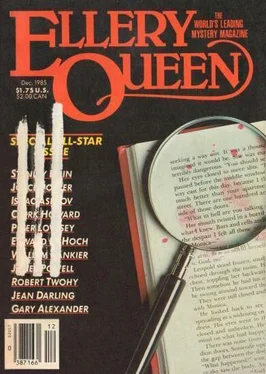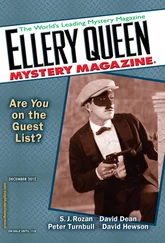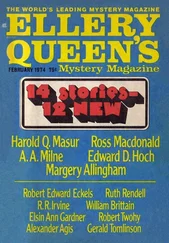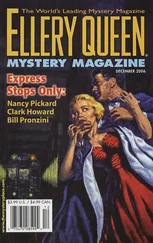Gary Alexander - Ellery Queen's Mystery Magazine, Vol. 86, No. 6. Whole No. 511, December 1985
Здесь есть возможность читать онлайн «Gary Alexander - Ellery Queen's Mystery Magazine, Vol. 86, No. 6. Whole No. 511, December 1985» весь текст электронной книги совершенно бесплатно (целиком полную версию без сокращений). В некоторых случаях можно слушать аудио, скачать через торрент в формате fb2 и присутствует краткое содержание. Город: New York, Год выпуска: 1985, Издательство: Davis Publications, Жанр: Детектив, на английском языке. Описание произведения, (предисловие) а так же отзывы посетителей доступны на портале библиотеки ЛибКат.
- Название:Ellery Queen's Mystery Magazine, Vol. 86, No. 6. Whole No. 511, December 1985
- Автор:
- Издательство:Davis Publications
- Жанр:
- Год:1985
- Город:New York
- ISBN:нет данных
- Рейтинг книги:5 / 5. Голосов: 1
-
Избранное:Добавить в избранное
- Отзывы:
-
Ваша оценка:
- 100
- 1
- 2
- 3
- 4
- 5
Ellery Queen's Mystery Magazine, Vol. 86, No. 6. Whole No. 511, December 1985: краткое содержание, описание и аннотация
Предлагаем к чтению аннотацию, описание, краткое содержание или предисловие (зависит от того, что написал сам автор книги «Ellery Queen's Mystery Magazine, Vol. 86, No. 6. Whole No. 511, December 1985»). Если вы не нашли необходимую информацию о книге — напишите в комментариях, мы постараемся отыскать её.
Ellery Queen's Mystery Magazine, Vol. 86, No. 6. Whole No. 511, December 1985 — читать онлайн бесплатно полную книгу (весь текст) целиком
Ниже представлен текст книги, разбитый по страницам. Система сохранения места последней прочитанной страницы, позволяет с удобством читать онлайн бесплатно книгу «Ellery Queen's Mystery Magazine, Vol. 86, No. 6. Whole No. 511, December 1985», без необходимости каждый раз заново искать на чём Вы остановились. Поставьте закладку, и сможете в любой момент перейти на страницу, на которой закончили чтение.
Интервал:
Закладка:
It was at this point that Griswold stirred. He grunted, sipped at his drink, and said, “I think I can match that performance, at least as far as the United States is concerned, and even outdo it.”
I said, “Come, come, Griswold, if you think you’re going to trap me into one of your bets—”
“Not at all,” said Griswold freezingly, “I was merely going to say that an interesting espionage puzzle once rested on just such a point, and I see now that I will be forced to explain.”
The matter [said Griswold] came up during the Second World War, when I was a young man on the fringes of the world of spy and counterspy. I was under the wing of one of the grand old hands of that world — Wingate, his name was. He’s long since dead, though he died in bed and in comfort, which was not true of many of us.
He told me the story one evening when we were taking a break from our efforts to work out just what the Germans knew, if anything, about our forthcoming landing at Salerno. It was a relief to turn to the simpler days before our entry into the First World War.
In 1916, as it is just possible one or another of you might know, the United States was having trouble with a Mexican revolutionary — well, we called him a bandit — named Pancho Villa. He gambled for popular support in Mexico against his Mexican opponents by trying to force the United States to intervene on the side of those opponents.
He did this by killing Americans. In January of that year, he stopped a train in northern Mexico, took off seventeen American engineers, and shot sixteen of them without even bothering to make up a reason. When that didn’t do the trick he actually sent four hundred raiders across the American line into the border town of Columbus, New Mexico. They burned the town and killed nineteen Americans.
That got him what he wanted. The United States could under no conditions sit still for that. We forced the Mexican government to grant permission, and a week after Villa’s raid we sent six thousand American troops under Black Jack Pershing into Mexico. They penetrated hundreds of miles into the country and kept up the case for nearly a year. The one thing they didn’t do, however, was catch Villa.
Villa, after all, was on his home turf and was swimming through a sea of sympathetic peasants. As week after week and month after month passed without a capture, the United States looked more and more like a paper tiger. Villa grew more and more popular with the Mexican people, and the Mexican government was forced to take on a more and more anti-American stance or it would lose all support. It was a fiasco for the U.S. that ended in February 1917 when a stubborn President Wilson was forced to bow to the inevitable because it was clear to him that we would soon be at war with Germany and have far more important problems on our hands. He recalled Pershing and Villa lived on until 1923 when he was assassinated by a Mexican enemy.
And yet Villa might have been caught fairly early on and things would have worked out well for the American forces because they had an ace operative on their side. He was a young man from across the border who had been an American citizen for the last decade. He was well tanned, he carefully cultivated a Mexican-style moustache, he could speak Mexican Spanish perfectly, and in the proper clothes no one could possibly doubt he was anything but Mexican.
He was a crackerjack scout. If anyone could have found Villa in the jumble of semi-desert hills and ravines in which the American division was trying to find its way, it was this man. He had joined the expedition under the name of Mackenzie Clifford, but few people knew that. To almost everyone, he was only Pedro.
He was a man of amazing skill. He managed to find peasants who for one reason or another were sufficiently anti-Villa to be willing to drop messages in places where they could be found by the proper people. He worked up a chain of helpers, and American soldiers saw him only in apparent accidental encounters during which he spoke only in Spanish and behaved like an ignorant peasant who dared not show openly the hostility he clearly felt. That was necessary. One never knew what eyes were watching, what ears were listening.
Generally he was heard from only by way of messages in cipher. They were mere substitution ciphers — those were simple days and whatever skills Villa and his men might have had, they did not include sophistication in deciphering coded messages. There was one complication, to be sure. There were twenty-six different systems of substitution, each one in itself simple. Each was tied to a letter of the alphabet and the variations for each letter had to be memorized, both by Pedro and by several men in the camp. That was better than risking the equivalent of a dictionary on a scrap of paper, which might be lost.
If you began with a key word, and used each letter of the word in turn as representing a particular variety of substitution, you might have a message consisting of, let us say, seven or eight t’s in a row that would yet be deciphered into a meaningful word. Naturally, the identity of the key word was all-important and it was periodically changed. Pedro chose them, and in the accidental meetings with him or with some of his Mexican allies there was always some reference to it that seemed innocent.
“I have a brother who lives in Mobile. Senor,” someone might say. That would seem to any unauthorized ear to be a natural attempt to curry favor with an armed and possibly dangerous foreign soldier, but it made Alabama the key word.
The key word was always the name of a state. There were forty-eight of them, which made sufficient variety, and they could be referred to with relative innocence and ease. Of course, against any sophisticated enemy the constant use of the name of a state would have been dangerous, but those were simple days.
Pedro managed to slip into camp one night — always a very risky thing. He was hot on the trail of Villa and had pinned him down, he thought, to a particular region. This region he intended to penetrate, and if he could — and stay alive — he might be able to send back a message by a trusted ally, provided he stayed alive. The few American soldiers who worked with Pedro — and my friend Wingate was the youngest of them — discussed possible ways of trapping Villa, if he were where Pedro thought he was, but it was clear that everything depended on just which valley he was in at the moment, and this was what Pedro had to find out.
It was only after Pedro had slipped out of camp as dawn was approaching that the soldiers realized he had not given them the key word for his next, all-important message. He might be able to send them the usual roundabout indication, but he might not. He should have told them while he was right there. After some agonized recrimination, it fell to Wingate, as junior man, to take out in pursuit of Pedro and get the information without blowing his cover.
Wingate took off with two enlisted men and, choosing the one decent path in the direction in which Pedro was going, they overtook him on his burro. Pedro looked at them in the dim light with considerable hostility. That hostility probably did not have to be assumed. Any contact with the Yanquis would give grounds for suspicion to anyone who might witness the event from the surrounding hills.
Wingate realized this and asked his questions brusquely, as a soldier might of a peon. In his broken Spanish he asked as to the neighboring villages and if there were armed men in the vicinity and if government armies had passed through and whether some key route might exist through the mountains. Some key route, he said, and the word “key” was scarcely emphasized.
Pedro answered sullenly, professing ignorance of even the simplest matters, as a peon might when addressing soldiers. Shrugging, he said, “I do not know how best to go through the mountains. There are many paths, and I stay at home, you understand. I have been told the paths are all straight on every side. I have heard the northernmost of these might be what you want, but I do not know for myself.”
Читать дальшеИнтервал:
Закладка:
Похожие книги на «Ellery Queen's Mystery Magazine, Vol. 86, No. 6. Whole No. 511, December 1985»
Представляем Вашему вниманию похожие книги на «Ellery Queen's Mystery Magazine, Vol. 86, No. 6. Whole No. 511, December 1985» списком для выбора. Мы отобрали схожую по названию и смыслу литературу в надежде предоставить читателям больше вариантов отыскать новые, интересные, ещё непрочитанные произведения.
Обсуждение, отзывы о книге «Ellery Queen's Mystery Magazine, Vol. 86, No. 6. Whole No. 511, December 1985» и просто собственные мнения читателей. Оставьте ваши комментарии, напишите, что Вы думаете о произведении, его смысле или главных героях. Укажите что конкретно понравилось, а что нет, и почему Вы так считаете.












